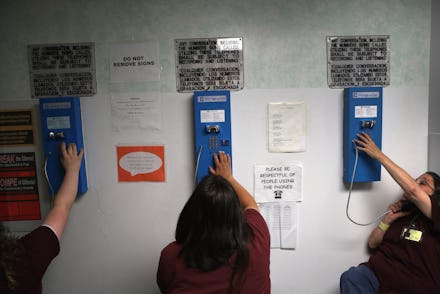Prisons Want to Use Tech to End In-Person Visits — These Librarians Have a Different Plan

Across the country, jails are replacing in-person visits with a glitchy, expensive system called "video visitation" — think of it like Skyping in to see your incarcerated loved one, if Skype was low-resolution, difficult to install and cost as much as $1.50 a minute.
But the librarians of Brooklyn are racing to roll out a more humane solution.
The Brooklyn Public Library is planning to build its own video visitations in 12 of its locations in neighborhoods with high rates of incarceration. Unlike visitation centers at country jails, the libraries will build visitation centers that are comfortable, humane and don't charge families exorbitant fees for connecting with loved ones.
"It's an intentionally human experience," Nick Higgins, Director of Outreach Services at Brooklyn Public Library, said in a phone call. "Anything that we do in jails or marginalized communities, we want to create a sense of belonging and inclusion. How life should be."
Higgins has been working with New York jails for almost 10 years, running programs like pushcart libraries that travel cell to cell once a week, or a service that records incarcerated parents reading books so that their children can hear their parents' voices reading to them.
"The jail is a manufactured, structured system," he said. "Your entire day is fairly regimented — when to wake up, when to go to bed. Then, once a week, in strolls a couple of librarians pushing a book cart. We're there to break the rhythm of that structure. That's what we go for with visitations as well."
Restoring humanity to visitation: The video visitation rooms at the libraries will be designed to be comforting and welcoming, with books and toys that the person who is incarcerated will also have during the visit, so they can read books to their children and participate in the same games and experiences as the visitor.
The rooms will be private, but not hidden away from sight — the BPL isn't trying to reinforce a shame and stigma around having an incarcerated family member.
In some jails, families can pay as much as $30 for a 20 minute visit. At the library, visits are free.
The BPL already built one of these visitation rooms at its central location, but as of Thursday morning, it was given nearly $400,000 in grant money from the Knight Foundation to expand to 12 libraries in total.
The end of visitation: Video visitation holds a promising potential — the ability to let you visit a loved one in jail even if they're all the way across the country. But the growing trend for county prisons in states like Texas and Oklahoma is to replace in-person visits with video entirely, even though receiving visits during a sentence is a vital factor in keeping someone from landing back in jail again.
A sweeping study of over 16,000 incarcerated people found that just one visit reduced the risk of another felony conviction by 13%.
Texas recently passed a law, HB 549, that affirms the right for people to have in-person visitation in county jails, and California is set to vote on a bill that would do the same for its 58 counties. But over 600 prisons in 46 states already have some form of video visitation, and eliminating in-person visits is appealing to prison telecoms that want to make a profit, as well as jails that want to shunt costs onto the families of people who are incarcerated.
Higgins sees the growing threat to in-person visitation, saying it's "completely wrong" and that in-person visits are necessary. But he hopes that the model that he's establishing with the BPL will lead as an example of a better ethical standard for counties and states adapting video visitation in the future.
"This technology is not going away, and is only going to grow across the country," Higgins said. "But we have an opportunity to demonstrate how it should be."
Read more: